Unit1 Where did you go on vacation同步知识点讲解课件(共95张PPT人教版八年级英语上册
文档属性
| 名称 | Unit1 Where did you go on vacation同步知识点讲解课件(共95张PPT人教版八年级英语上册 | 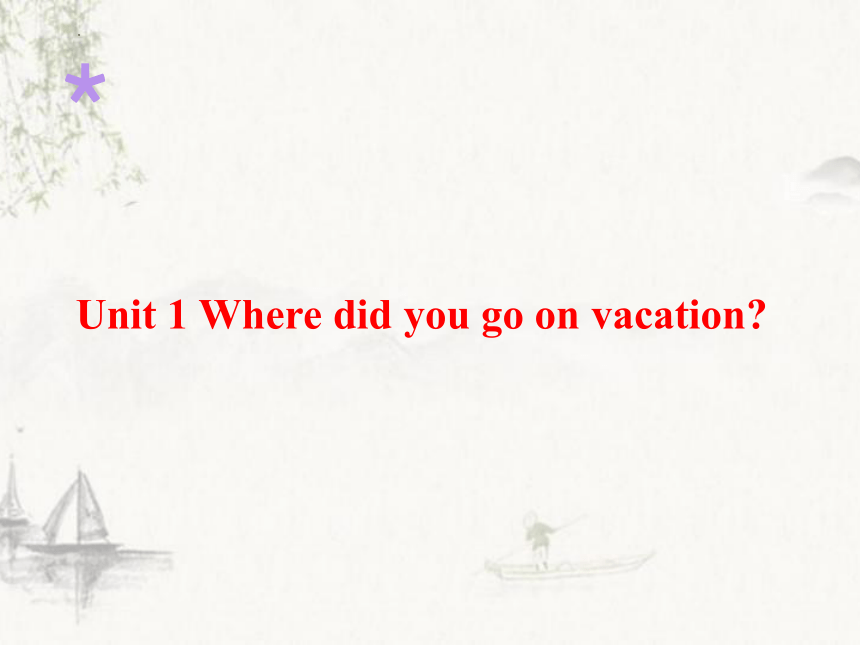 | |
| 格式 | pptx | ||
| 文件大小 | 580.1KB | ||
| 资源类型 | 教案 | ||
| 版本资源 | 人教新目标(Go for it)版 | ||
| 科目 | 英语 | ||
| 更新时间 | 2024-01-23 17:05:52 | ||
图片预览


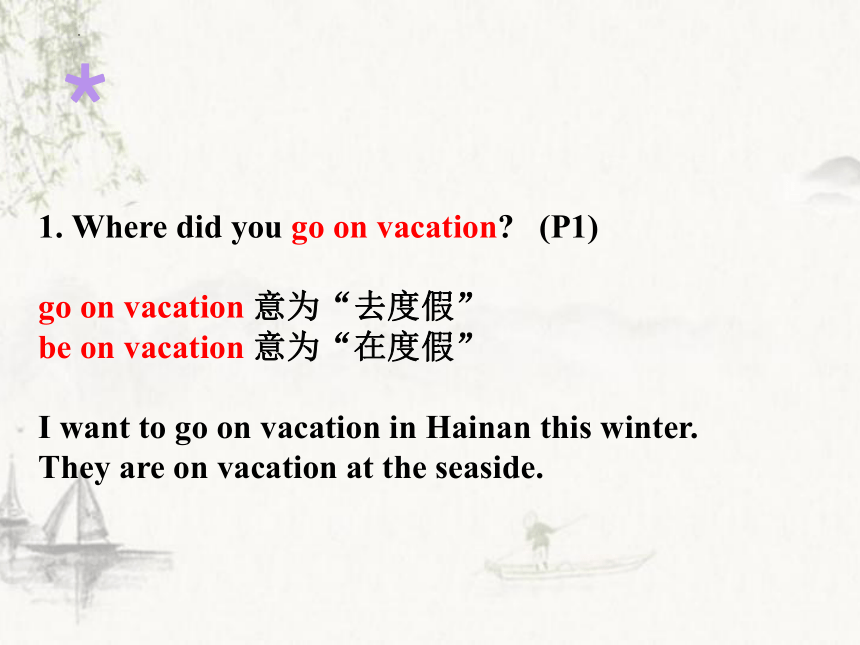
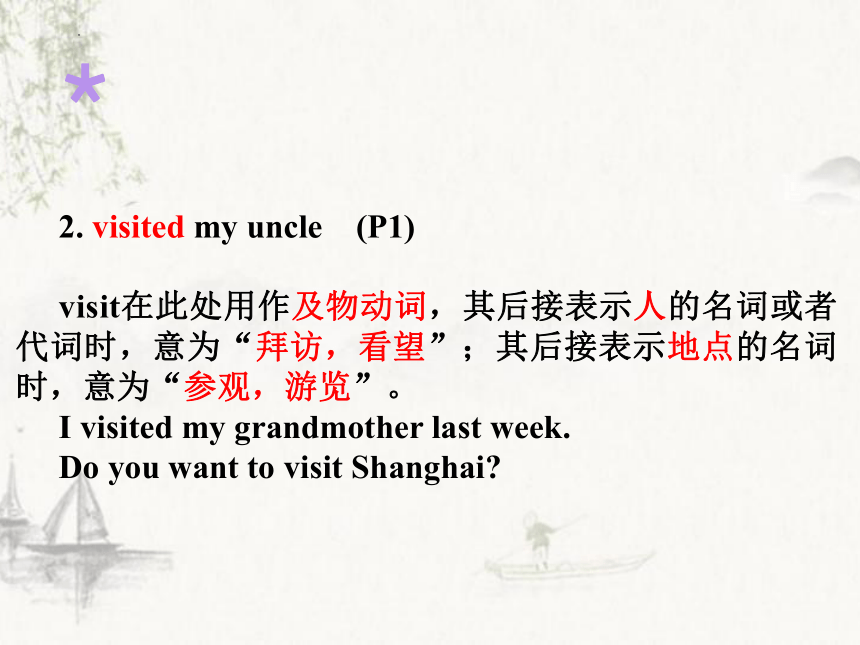

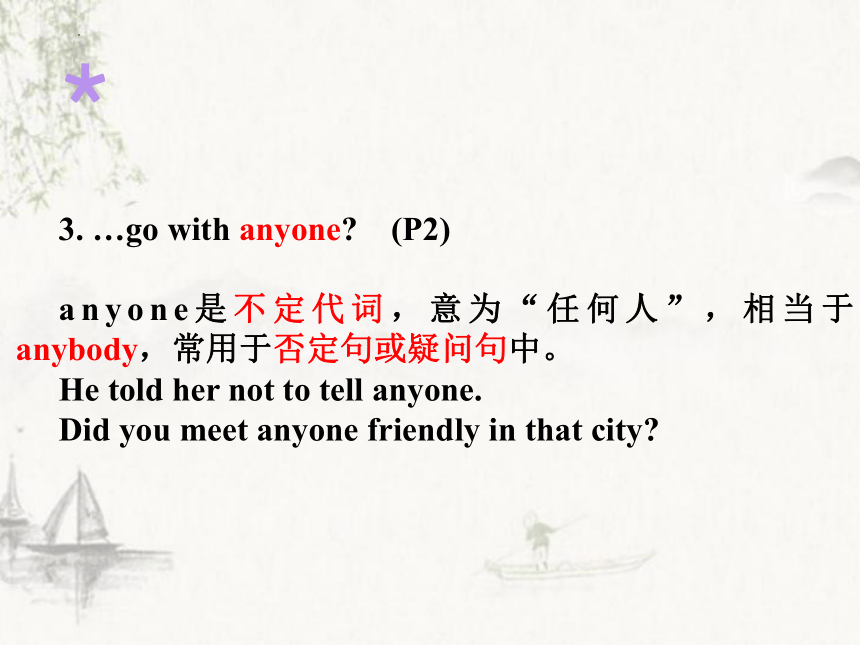

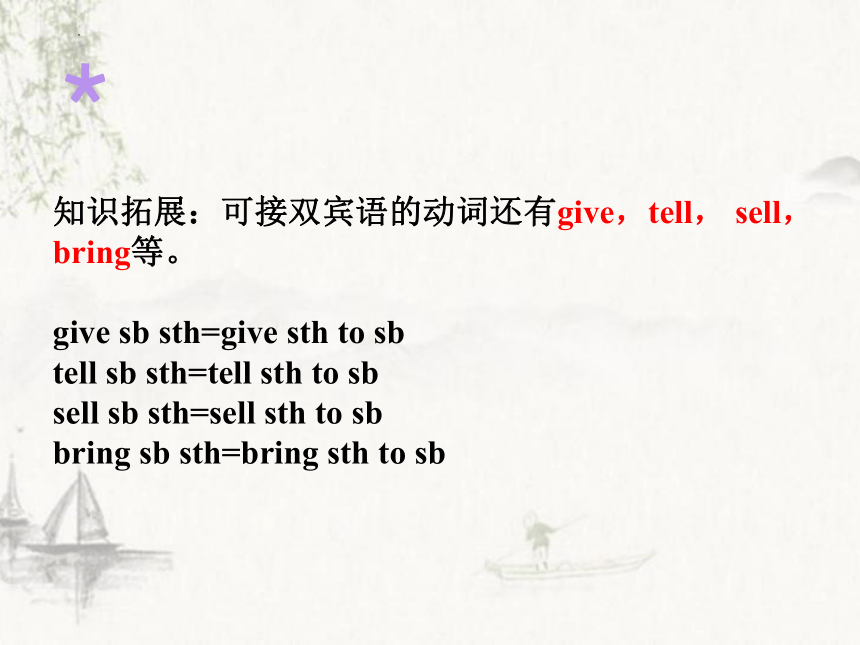
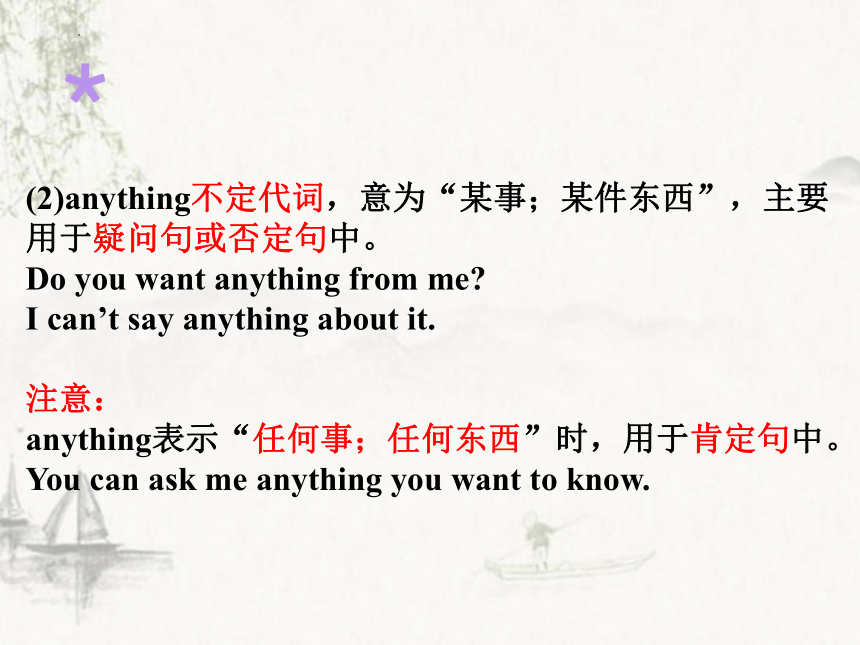
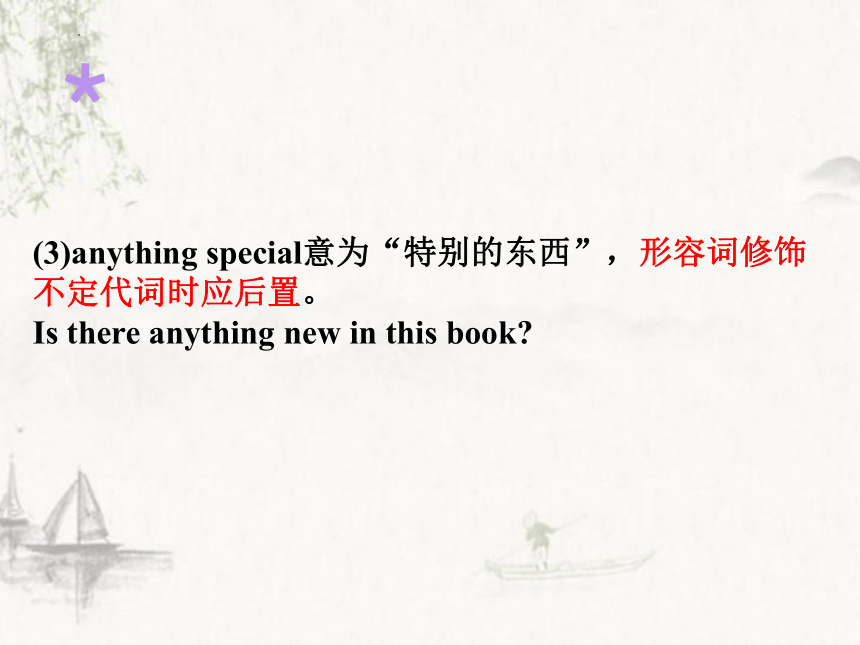
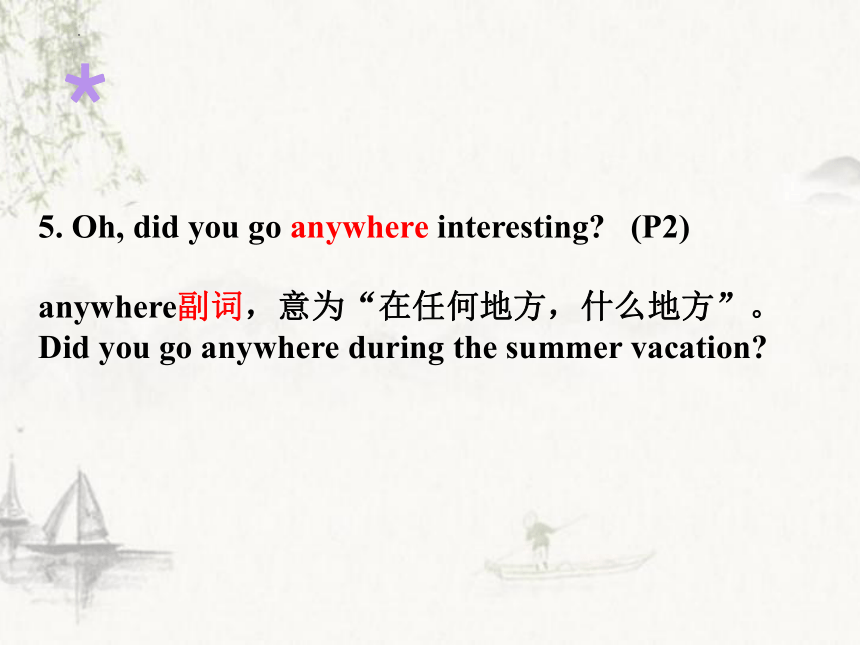
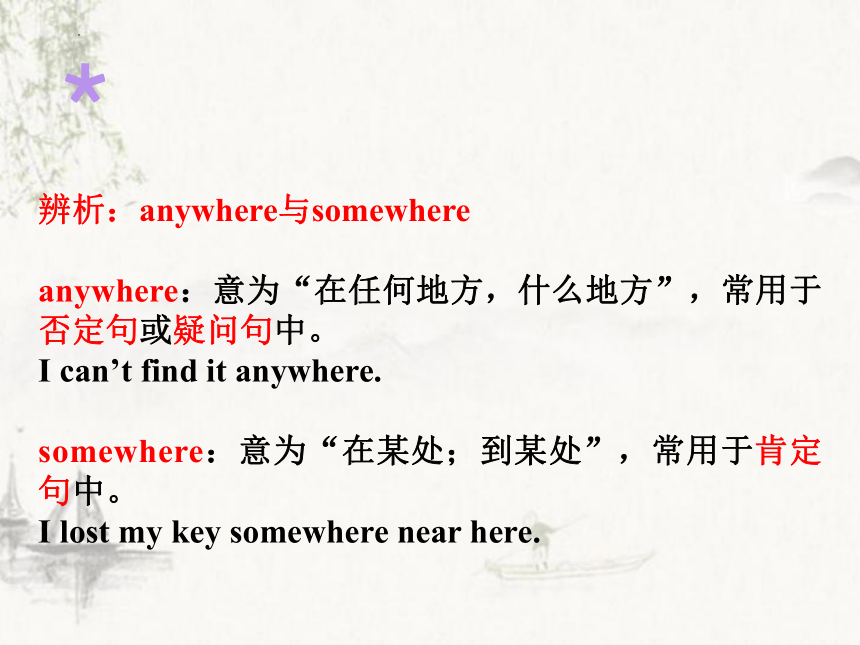
文档简介
(共95张PPT)
Unit 1 Where did you go on vacation
PART 01
Section A
1. Where did you go on vacation (P1)
go on vacation 意为“去度假”
be on vacation 意为“在度假”
I want to go on vacation in Hainan this winter.
They are on vacation at the seaside.
2. visited my uncle (P1)
visit在此处用作及物动词,其后接表示人的名词或者代词时,意为“拜访,看望”;其后接表示地点的名词时,意为“参观,游览”。
I visited my grandmother last week.
Do you want to visit Shanghai
知识拓展:
①visit还可用作名词,意为“访问,参观,拜访”。
This is my first visit to China.
②visitor意为“参观者;游客”。
These visitors come from America.
3. …go with anyone (P2)
anyone是不定代词,意为“任何人”,相当于 anybody,常用于否定句或疑问句中。
He told her not to tell anyone.
Did you meet anyone friendly in that city
4. buy anything special (P2)
(1)buy及物动词,意为“买;购买”。其过去式为 bought。buy后可接双宾语,即buy sb sth=buy sth for sb,意为“给某人买某物”。
I want to buy some bread in that supermarket.
My father bought me a bike.
=My father bought a bike for me
知识拓展:可接双宾语的动词还有give,tell, sell, bring等。
give sb sth=give sth to sb
tell sb sth=tell sth to sb
sell sb sth=sell sth to sb
bring sb sth=bring sth to sb
(2)anything不定代词,意为“某事;某件东西”,主要用于疑问句或否定句中。
Do you want anything from me
I can’t say anything about it.
注意:
anything表示“任何事;任何东西”时,用于肯定句中。
You can ask me anything you want to know.
(3)anything special意为“特别的东西”,形容词修饰不定代词时应后置。
Is there anything new in this book
5. Oh, did you go anywhere interesting (P2)
anywhere副词,意为“在任何地方,什么地方”。
Did you go anywhere during the summer vacation
辨析:anywhere与somewhere
anywhere:意为“在任何地方,什么地方”,常用于否定句或疑问句中。
I can’t find it anywhere.
somewhere:意为“在某处;到某处”,常用于肯定句中。
I lost my key somewhere near here.
6. We took quite a few photos there. (P2)
(1)take photos意为“照相;拍照”。 take a photo/ photos of sb /sth 则意为“给某人/某物拍照”。
We took many photos on the Great Wall.
Could you take a photo of us
(2)quite a few意为“相当多;不少”,修饰可数名词复数。
There are quite a few people in the restaurant.
He has quite a few brothers and sisters.
注意:
不要将quite a few与a few(少数几个)混清。
辨析: quite a few与quite a little
quite a few:“相当多;不少”。修饰可数名词复数。
He will stay here for quite a few days.
quite a little:“许多,相当多”。修饰不可数名词。
There is quite a little water in the bottle.
7. I just stayed at home most of the time to read and relax. (P2)
most of the time意为“大部分时间”,其中most为代词,意为“大部分;大多数;大体上”。
It’s noisy here most of the time.
Most of the time Alan studies hard.
Most of us are going to the park.
Most of the food goes bad.
8. Everything tasted really good. (P3)
taste此处作连系动词,意为“有…的味道”,其后接形容词构成系表结构。
The food tastes really great.
The milk tasted terrible.
其他表示感觉的连系动词还有:
look看起来好像
sound听起来好像
smell闻起来好像
feel 感觉,觉得
That sounds fun.
This fish smells bad.
—The medicine __A___ terrible. I can’t stand it.
—I know. But it’s helpful for you.
A. tastes
B. eats
C. drinks
D. takes
9. Did everyone have a good time (P3)
have a good time意为“玩得开心,过得愉快”,其同义短语为 enjoy oneself/ have fun。
We had a good time at the party.
=We enjoyed ourselves at the party.
=We had fun at the party.
have a good time doing sth 意为“做某事很高兴”。
I had a good time visiting my aunt last month.
10. Did you go shopping (P3)
go shopping意为“去购物,去买东西”,同义短语为do some shopping。
I usually go shopping on Sundays.
类似的短语:
go climbing去爬山 go skating去滑冰
go hiking去远足 go sightseeing去观光
go fishing去钓鱼 go swimming去游泳
go camping去野营 go surfing去冲浪
go bike riding骑自行车旅行 go boating去划船
go skateboarding去进行滑板运动
11. The only problem was that there was nothing much to do in the evening but read. (P3)
nothing much to do意为“没什么事可做”。
There is nothing much to do, so I go to bed early.
注意:
nothing…but… 意为“除…之外什么也没有;只有”。but后可接名词或动词原形。
I had nothing but a cup of tea this morning.
I had nothing to do but watch TV.
12. Still no one seemed to be bored. (P3)
(1)“seem (+to be)+名词或形容词”意为“看起来…,好像…”,说明主语的特征或状态,to be可省略。
Tom seems to be a very clever boy.
Mr. Black seemed to be quite happy.
知识拓展:seem的其他用法
①seem to do sth“好像/似乎做某事”。
Tom seems to know everything.
②It seems/seemed that…“看起来好像…;似乎”。
It seems that she is thinking.
③It seems as if…“看起来像/仿佛…”。
It seems as if it is going to rain.
(2)辨析: bored与boring
bored:厌倦的;烦闷的;感到无聊的,一般在句中修饰人,作表语。
I’m bored with what he said.
boring:无趣的;令人厌烦的;单调的,一般在句中修饰事或物,可作表语或定语。
The story is very boring.
=This is a boring story.
这类形容词还有:
interested —— interesting
excited ——exciting
surprised —— surprising
Everyone was ____ when they heard the ____ news.
A. exciting; exciting
B. excited; exciting
C. exciting; excited
答案:B
13. Bye for now! 就写到这里吧,再见!(P3)
此句多用于书信、邮件的结束语,意为“到此为止!就此止笔”,相当于Just stop here! “就到这儿吧!”。
PART 02
Section B
1. What activities do you find enjoyable (P5)
(1)activity可数名词,意为“活动”。其复数形式为
activities。
Students like outdoor activities.
Tennis and swimming are her favorite activities.
(2)enjoyable形容词,意为“有乐趣的,令人愉快的”。
I’m sure we will have an enjoyable vacation.
The job is enjoyable. I like it very much.
2. I arrived in Penang in Malaysia this morning with my family. (P5)
arrive不及物动词,意为“到达”。 arrive in表示到达较大的地方,如国家、省、市等;arrive at表示到达较小的地方,如机场、商店、广场、村庄等。
We arrived in Beijing yesterday.
I arrived at the train station very early.
辨析: arrive (in/at),get(to)与 reach
(1)arrive和get都是不及物动词,其后只能跟表示地点的副词(here,there,home等),若跟地点名词则须加介词,即“ arrive in/at+地点名词”“get to+地点名词”。
How did you arrive/ get there
I arrived in/got to Qingdao yesterday.
When do you often arrive at/get to school
(2)reach作及物动词,其后直接跟表示地点的名词。
I reached Qingdao yesterday.
3. So we decided to go to the beach near the hotel. (P5)
(1)decide及物动词,意为“决定;决心”,其常见用法有:
①decide to do sth 意为“决定去做某事”。其否定形式为decide not to do sth ,意为“决定不做某事”。
They decide to visit the museum.
I decide to buy a new car.
②decide后常跟“疑问词+动词不定式”作宾语。
He can not decide when to leave.
③decide后面常跟宾语从句。
I can’t decide where I should go.
(2)decide也可作不及物动词, decide on sth 意为“就某事做决定”。
Don’t decide on important matters too quickly.
(3)decision为名词,意为“决定”。 make a decision意为“做一个决定”。
I made a decision to read English every day.
Harry has decided ____ an online shop after graduating from school
A. open
B. to open
C. opened
D. opening
答案:B
4. My sister and I tried paragliding. (P5)
try此处用作及物动词,其后常接名词、动名词或不定式,意为“尝试;试图,设法;努力”。
She is trying my bicycle.
辨析: try doing sth与 try to do sth
try doing sth:“尝试着做某事”,表示一种尝试、做做看的想法,不一定付出很多努力。
I tried calling him, but no one answered.
try to do sth:“尽力,设法去做某事”,表示想尽一切办法要把事情办成,强调付出一定的努力设法去完成某事 。
I’m trying to learn English well.
知识拓展:
①try也可用作不及物动词,意为“尝试;努力”。
I don’t think I can do it, but I will try.
②try用作可数名词,意为“尝试”,常用于短语have a try,意为“试一试”。
I’m going to have a try.
5. I felt like I was a bird. (P5)
feel like意为“感觉像”。其后常接从句。
He feels like he is swimming.
Lucy feels like she is in a very nice dream.
知识拓展:
feel like还可意为“想要”,其后可接名词、代词或动名词。
feel like doing sth=want to do sth= would like to do sth 意为“想要做某事”。
Do you feel like taking a walk in the park with me
=Do you want to take a walk in the park with me
Would you like to take a walk in the park with me?
When summer comes, a lot of people feel like ____ to have fun.
A. to swim
B. swim
C. swimming
D. have swum
答案:C
6. I really enjoyed walking around the town. (P5)
enjoy及物动词,意为“喜爱;欣赏;享受…的乐趣”,其后可接名词、代词或动名词作宾语。
Do you enjoy your job
I enjoy reading books.
知识拓展:后接动名词作宾语的其他常用的动词还有
finish完成, practice练习,mind介意
I finished reading the storybook yesterday.
Tom often practices playing the guitar after school.
7. What a difference a day makes! (P5)
(1)本句是what引导的感叹句,结构为:What+名词(词组)+主语+谓语!此句式所强调的成分是what后面的名词(词组)。
What fun today is!
What a cute dog it is!
(2)difference可数名词,意为“差别,差异”,其形容词形式为 different,意为“不同的;有差异的”。
The twins look the same. But they also have some differences.
He is different from his little brother.
8. We wanted to walk up to the top, but then it started raining a little so we decided to take the train. (P5)
(1)①want to do sth 意为“想要做某事”。
I want to go to the park next Sunday.
②want sth 意为“想要某物”。
1 want a new sweater.
③want sb to do sth 意为“想要某人做某事”。
He wants Linda to answer the question.
(2) start doing sth 意为“开始做某事”,同义短语: start to do sth 。
She started doing her homework after dinner.
(3)a little意为“一点儿”,在句中可修饰动词、形容词或副词。
I can draw a little, but only as a hobby.
It’ s a little cold outside.
a little也可修饰不可数名词。
There is a little water in the bottle.
9. We waited over an hour for the train because there were too many people. (P5)
(1)wait for意为“等候”,其后可接人或物。
I’ll wait for you at the door.
Tom was waiting for a bus over there.
(2)over介词,意为“多于;超过;在…以上(表示数目、程度)”,相当于more than。
My father is over 40 years old.
知识拓展:
①over表示“在…之上”,与物体垂直且不接触,反义词为 under。
There is a map over the blackboard.
②over表示“通过”。
I hear the news over the radio.
③over表示“遍及”。
I want to travel all over the world.
(3)辨析:too many, too much与 much too
too many:“太多的…”,其后要接可数名词复数形式。
There are too many flowers in the garden.
too much:“太多的…”,后接不可数名词,还可修饰动词作状语。
I have too much homework this evening.
He talks too much.
much too:“太…”,much用来增强语气,后面常接形容词或副词。
This little boy is much too fat.
You are walking much to fast.
10. And because of the bad weather, we couldn’t see anything below. (P5)
(1)because of,介词短语,意为“因为,由于”,后接名词、代词、动名词或名词性短语 。
He can’t take a walk because of the rain.
because,连词,意为“因为”,后接句子,引导原因状语从句。
I can’t go to school today because I’m ill.
(2)below此处作副词,意为“在下面;到下面”。
Please write your name below.
From the top of the mountain I could see the village below.
below还可作介词,意为“在…以下;低于”。反义词为above,意为“超过;在…之上”。
It was five below zero last night.
11. My father didn’t bring enough money. (P5)
bring为及物动词,意为“带来;取来”;反义词为take,意为“拿走”。 bring sth/sb to… 意为“把某物/某人带到…”。
Why don’t you bring your camera to the party
Pease take these books to the library.
辨析:bring,take与carry
bring:“带来,拿来”,指从别处带到说话者所在的
地方来。
Please bring your family photo here.
take:“带走,拿走”,指从说话者所在的地方带到远处去。方向上正好与bring相反。
His father often takes him to the zoo on weekends.
carry:“搬运”,无方向性。
The box is too heavy for the boy to carry.
(2)①enough此处作形容词,意为“足够的,充分的”,作定语修饰名词,一般放在名词前面。
We have enough time to do our homework.
There are enough seats for ten people.
②enough还可用作副词,来修饰形容词,副词或动词,通常放在被修饰语之后。
He didn’t practice enough.
She isn’t good enough for the exam.
He knows the situation well enough.
12. because we forget to bring an umbrella. (P6)
forget此处及物动词,其后可直接跟宾语,也可跟动词不定式或动名词作宾语。forget的反义词为remember。
Let’s forget the bad past!
辨析: forget to do sth与 forget doing sth
forget to do sth:忘记要做某事(事情还没有做)
Don’t forget to close the door.
forget doing sth:忘记做过某事(事情已经做了)
I forgot closing the door.
—What’s this
—Oh, my God! It’s a gift for James. I forget ___ it this afternoon.
A. to post
B. posting
C. post
Did you dislike anything (P7)
dislike及物动词,意为“不喜欢,厌恶”,其后可接名词、代词或动名词作宾语。同义词是hate。
Mary dislikes the hamburgers.
I dislike playing computer games.
14. Why not (P8)
Why not 意为“为什么不呢?”,表示提建议; Why not后面跟动词原形。相当于“Why don’t you+动词原形 ”。
Why not take a walk
Why not go to the party with me
Why don’t you go to the party with me
15. Everyone in our class took a bag with some food and water. (P8)
with介词,意为“具有;带有”。此处介词短语 with some food and water作bag的后置定语。
He’s a tall kid with short hair.
I often dream of a big house with a garden.
with作介词时的其他用法:
①和…在一起
I often go to school with my friends
②以(手段、材料),用(工具)
Cut the apple with a knife.
16. My legs were so tired that I wanted to stop. (P8)
so…that…意为“如此…以至于…”,引导结果状语从句。so是副词,常常用来修饰形容词或副词。
He is so young that he can’t look after himself.
The boy ran so fast that I couldn’t catch up with him.
辨析:so…that…和so that
(1) so…that…:“so+形容词或副词+that”,意为“如此…以至于…”,引导结果状语从句。
She was so busy that she had no time to rest.
(2) so that:引导目的状语从句,意为“以便;为了”,从句中常用can/could / may /should等情态动词。
The little boy saved money so that he could buy his mother a present on Mother’s Day.
The movie is ____ wonderful ____I want to see it again.
A. too: to
B. so: that
C. as: as
D. so: as
答案:B
17. My classmates told me to keep going, so I went on. (P8)
(1)tell sb to do sth 意为“告诉某人做某事”。 tell sb not to do sth 意为“告诉某人不要做某事”。
The teacher tells us to clean the windows.
I told him not to draw on the wall.
—What did Mr. Green say to his son
—He told him______.
didn’t smoke
B. don’t smoke
C. not to smoke
D. not smoke
答案:C
(2)keep doing sth 意为“继续做某事,一直做某事”。
Li Lei keeps reading English for half an hour every day.
She kept watching TV for two hours last night.
(3)go on为固定短语,意为“继续下去;(时间)过去;发生”。
We have to go on although the task is quite difficult.
The time goes on very fast.
18. Everyone jumped up and down in excitement. (P8)
(1)jump此处作不及物动词,意为“跳跃”。
We jumped happily when we heard the good news.
与jump相关的短语:
jump into跳入
jump of跳离
jump over跳过
jump out of跳出
(2)up and down意为“上上下下;来来往往”,在句中作状语。
They looked me up and down.
He walks up and down the room.
19. Twenty minutes later, the sun started to come up. (P8)
come up意为“升起;发生”。
It gets hot after the sun comes up.
Please let me know if anything comes up.
知识拓展:与come相关的短语
come along一起去;进展 come over过来
come down下降,下落 come on赶快,加油
come true实现,成为现实 come in进来
come out出来;出版,发行;开花
come up with追上;想出(主意)
PART 03
单元归纳
一、短语归纳
1. go on vacation 去度假
2. stay at home待在家里
3. go to the mountains去山区
4. go to the beach去海滩
5. visit museums 参观博物馆
6. go to summer camp去参加夏令营
7. quite a few相当多;不少
8. study for… 为…而学习
9. go out 出去
10. most of the time大部分时间
11. taste good尝起来很好吃
12. have a good time玩得高兴;过得愉快
13. of course当然;自然
14. keep a diary记日记
15. go shopping去买东西
16. in the past在过去
17. walk around四处走走
18. too many太多
19. because of 因为
20. one bowl of… 一碗…
21. the next day第二天
22. drink tea喝茶
23. find out找出;查明
24. go on 继续
25. take photos照相
26. something important 重要的事
27. up and down上上下下
e up 升起
二、用法归纳
1.buy sth for sb = buy sb sth 为某人买某物
2. taste+形容词 尝起来…
3.nothing…but+动词原形 除了…之外什么都没有
4.seem+(to be+)形容词/名词 看起来…
5. arrive in+大地方 arrive at+小地方 到达某地
6. decide to do sth 决定做某事
7. try doing sth 尝试做某事
try to do sth 尽力去做某事
8. feel like doing sth 想要做某事
9. enjoy doing sth 喜欢做某事
10. want to do sth 想做某事
11. start doing sth 开始做某事
12. stop doing sth 停止做某事
13. look+形容词 看起来…
14. dislike doing sth 不喜欢做某事
15. Why not do sth… 为什么不做某事呢?
16. so+形容词+that+从句 如此…以至于…
17. tell sb (not) to do sth 告诉某人(不要)做某事
18. keep doing sth 继续做某事
19. forget to do sth 忘记去做某事
forget doing sth 忘记做过某事
三、语法归纳:复合不定代词
复合不定代词是由 some-, any-, no-, every-加上-one,-body, -thing 等所组成的不定代词。常见的复合不定代词有:
1. 当形容词或else修饰复合不定代词时,不定代词总是位于修饰词的前面。例如:
There is nothing new in his speech.
Did she tell you anything else
2. 复合不定代词作主语视为单数,谓语动词用单数如:
Nobody knows his name.
Nothing is impossible.
Someone is waiting for you at the door.
3. some-复合不定代词
(1)一般用于肯定句中。
I have something important to tell you.
(2)也可用于疑问句中,希望得到对方的肯定回答或委婉提出建议与要求。
Would you like something to eat
Will you ask someone to carry the box for me
4. anyone, anything也可用于肯定句,前者表示“任何人”,后者表示“任何事”。
Anyone can do this.
I can do anything for you.
5. every-复合不定代词与not连用,表示部分否定;而any-复合不定代词与not连用,表示全部否定。
He didn’t know everything about it.
Not everyone likes watching TV.
I didn’t know anybody about these stars.
6.在反意疑问句中,表示人的复合不定代词在陈述句中作主语时,简略问句中的主语用he或they;如果表示物的复合不定代词在陈述句中作主语,简略问句中的主语用it。
Everyone is here, aren’t they
Everything is ready, isn’t it
Somebody is waiting for me at the gate, aren’t they
谢谢!
Unit 1 Where did you go on vacation
PART 01
Section A
1. Where did you go on vacation (P1)
go on vacation 意为“去度假”
be on vacation 意为“在度假”
I want to go on vacation in Hainan this winter.
They are on vacation at the seaside.
2. visited my uncle (P1)
visit在此处用作及物动词,其后接表示人的名词或者代词时,意为“拜访,看望”;其后接表示地点的名词时,意为“参观,游览”。
I visited my grandmother last week.
Do you want to visit Shanghai
知识拓展:
①visit还可用作名词,意为“访问,参观,拜访”。
This is my first visit to China.
②visitor意为“参观者;游客”。
These visitors come from America.
3. …go with anyone (P2)
anyone是不定代词,意为“任何人”,相当于 anybody,常用于否定句或疑问句中。
He told her not to tell anyone.
Did you meet anyone friendly in that city
4. buy anything special (P2)
(1)buy及物动词,意为“买;购买”。其过去式为 bought。buy后可接双宾语,即buy sb sth=buy sth for sb,意为“给某人买某物”。
I want to buy some bread in that supermarket.
My father bought me a bike.
=My father bought a bike for me
知识拓展:可接双宾语的动词还有give,tell, sell, bring等。
give sb sth=give sth to sb
tell sb sth=tell sth to sb
sell sb sth=sell sth to sb
bring sb sth=bring sth to sb
(2)anything不定代词,意为“某事;某件东西”,主要用于疑问句或否定句中。
Do you want anything from me
I can’t say anything about it.
注意:
anything表示“任何事;任何东西”时,用于肯定句中。
You can ask me anything you want to know.
(3)anything special意为“特别的东西”,形容词修饰不定代词时应后置。
Is there anything new in this book
5. Oh, did you go anywhere interesting (P2)
anywhere副词,意为“在任何地方,什么地方”。
Did you go anywhere during the summer vacation
辨析:anywhere与somewhere
anywhere:意为“在任何地方,什么地方”,常用于否定句或疑问句中。
I can’t find it anywhere.
somewhere:意为“在某处;到某处”,常用于肯定句中。
I lost my key somewhere near here.
6. We took quite a few photos there. (P2)
(1)take photos意为“照相;拍照”。 take a photo/ photos of sb /sth 则意为“给某人/某物拍照”。
We took many photos on the Great Wall.
Could you take a photo of us
(2)quite a few意为“相当多;不少”,修饰可数名词复数。
There are quite a few people in the restaurant.
He has quite a few brothers and sisters.
注意:
不要将quite a few与a few(少数几个)混清。
辨析: quite a few与quite a little
quite a few:“相当多;不少”。修饰可数名词复数。
He will stay here for quite a few days.
quite a little:“许多,相当多”。修饰不可数名词。
There is quite a little water in the bottle.
7. I just stayed at home most of the time to read and relax. (P2)
most of the time意为“大部分时间”,其中most为代词,意为“大部分;大多数;大体上”。
It’s noisy here most of the time.
Most of the time Alan studies hard.
Most of us are going to the park.
Most of the food goes bad.
8. Everything tasted really good. (P3)
taste此处作连系动词,意为“有…的味道”,其后接形容词构成系表结构。
The food tastes really great.
The milk tasted terrible.
其他表示感觉的连系动词还有:
look看起来好像
sound听起来好像
smell闻起来好像
feel 感觉,觉得
That sounds fun.
This fish smells bad.
—The medicine __A___ terrible. I can’t stand it.
—I know. But it’s helpful for you.
A. tastes
B. eats
C. drinks
D. takes
9. Did everyone have a good time (P3)
have a good time意为“玩得开心,过得愉快”,其同义短语为 enjoy oneself/ have fun。
We had a good time at the party.
=We enjoyed ourselves at the party.
=We had fun at the party.
have a good time doing sth 意为“做某事很高兴”。
I had a good time visiting my aunt last month.
10. Did you go shopping (P3)
go shopping意为“去购物,去买东西”,同义短语为do some shopping。
I usually go shopping on Sundays.
类似的短语:
go climbing去爬山 go skating去滑冰
go hiking去远足 go sightseeing去观光
go fishing去钓鱼 go swimming去游泳
go camping去野营 go surfing去冲浪
go bike riding骑自行车旅行 go boating去划船
go skateboarding去进行滑板运动
11. The only problem was that there was nothing much to do in the evening but read. (P3)
nothing much to do意为“没什么事可做”。
There is nothing much to do, so I go to bed early.
注意:
nothing…but… 意为“除…之外什么也没有;只有”。but后可接名词或动词原形。
I had nothing but a cup of tea this morning.
I had nothing to do but watch TV.
12. Still no one seemed to be bored. (P3)
(1)“seem (+to be)+名词或形容词”意为“看起来…,好像…”,说明主语的特征或状态,to be可省略。
Tom seems to be a very clever boy.
Mr. Black seemed to be quite happy.
知识拓展:seem的其他用法
①seem to do sth“好像/似乎做某事”。
Tom seems to know everything.
②It seems/seemed that…“看起来好像…;似乎”。
It seems that she is thinking.
③It seems as if…“看起来像/仿佛…”。
It seems as if it is going to rain.
(2)辨析: bored与boring
bored:厌倦的;烦闷的;感到无聊的,一般在句中修饰人,作表语。
I’m bored with what he said.
boring:无趣的;令人厌烦的;单调的,一般在句中修饰事或物,可作表语或定语。
The story is very boring.
=This is a boring story.
这类形容词还有:
interested —— interesting
excited ——exciting
surprised —— surprising
Everyone was ____ when they heard the ____ news.
A. exciting; exciting
B. excited; exciting
C. exciting; excited
答案:B
13. Bye for now! 就写到这里吧,再见!(P3)
此句多用于书信、邮件的结束语,意为“到此为止!就此止笔”,相当于Just stop here! “就到这儿吧!”。
PART 02
Section B
1. What activities do you find enjoyable (P5)
(1)activity可数名词,意为“活动”。其复数形式为
activities。
Students like outdoor activities.
Tennis and swimming are her favorite activities.
(2)enjoyable形容词,意为“有乐趣的,令人愉快的”。
I’m sure we will have an enjoyable vacation.
The job is enjoyable. I like it very much.
2. I arrived in Penang in Malaysia this morning with my family. (P5)
arrive不及物动词,意为“到达”。 arrive in表示到达较大的地方,如国家、省、市等;arrive at表示到达较小的地方,如机场、商店、广场、村庄等。
We arrived in Beijing yesterday.
I arrived at the train station very early.
辨析: arrive (in/at),get(to)与 reach
(1)arrive和get都是不及物动词,其后只能跟表示地点的副词(here,there,home等),若跟地点名词则须加介词,即“ arrive in/at+地点名词”“get to+地点名词”。
How did you arrive/ get there
I arrived in/got to Qingdao yesterday.
When do you often arrive at/get to school
(2)reach作及物动词,其后直接跟表示地点的名词。
I reached Qingdao yesterday.
3. So we decided to go to the beach near the hotel. (P5)
(1)decide及物动词,意为“决定;决心”,其常见用法有:
①decide to do sth 意为“决定去做某事”。其否定形式为decide not to do sth ,意为“决定不做某事”。
They decide to visit the museum.
I decide to buy a new car.
②decide后常跟“疑问词+动词不定式”作宾语。
He can not decide when to leave.
③decide后面常跟宾语从句。
I can’t decide where I should go.
(2)decide也可作不及物动词, decide on sth 意为“就某事做决定”。
Don’t decide on important matters too quickly.
(3)decision为名词,意为“决定”。 make a decision意为“做一个决定”。
I made a decision to read English every day.
Harry has decided ____ an online shop after graduating from school
A. open
B. to open
C. opened
D. opening
答案:B
4. My sister and I tried paragliding. (P5)
try此处用作及物动词,其后常接名词、动名词或不定式,意为“尝试;试图,设法;努力”。
She is trying my bicycle.
辨析: try doing sth与 try to do sth
try doing sth:“尝试着做某事”,表示一种尝试、做做看的想法,不一定付出很多努力。
I tried calling him, but no one answered.
try to do sth:“尽力,设法去做某事”,表示想尽一切办法要把事情办成,强调付出一定的努力设法去完成某事 。
I’m trying to learn English well.
知识拓展:
①try也可用作不及物动词,意为“尝试;努力”。
I don’t think I can do it, but I will try.
②try用作可数名词,意为“尝试”,常用于短语have a try,意为“试一试”。
I’m going to have a try.
5. I felt like I was a bird. (P5)
feel like意为“感觉像”。其后常接从句。
He feels like he is swimming.
Lucy feels like she is in a very nice dream.
知识拓展:
feel like还可意为“想要”,其后可接名词、代词或动名词。
feel like doing sth=want to do sth= would like to do sth 意为“想要做某事”。
Do you feel like taking a walk in the park with me
=Do you want to take a walk in the park with me
Would you like to take a walk in the park with me?
When summer comes, a lot of people feel like ____ to have fun.
A. to swim
B. swim
C. swimming
D. have swum
答案:C
6. I really enjoyed walking around the town. (P5)
enjoy及物动词,意为“喜爱;欣赏;享受…的乐趣”,其后可接名词、代词或动名词作宾语。
Do you enjoy your job
I enjoy reading books.
知识拓展:后接动名词作宾语的其他常用的动词还有
finish完成, practice练习,mind介意
I finished reading the storybook yesterday.
Tom often practices playing the guitar after school.
7. What a difference a day makes! (P5)
(1)本句是what引导的感叹句,结构为:What+名词(词组)+主语+谓语!此句式所强调的成分是what后面的名词(词组)。
What fun today is!
What a cute dog it is!
(2)difference可数名词,意为“差别,差异”,其形容词形式为 different,意为“不同的;有差异的”。
The twins look the same. But they also have some differences.
He is different from his little brother.
8. We wanted to walk up to the top, but then it started raining a little so we decided to take the train. (P5)
(1)①want to do sth 意为“想要做某事”。
I want to go to the park next Sunday.
②want sth 意为“想要某物”。
1 want a new sweater.
③want sb to do sth 意为“想要某人做某事”。
He wants Linda to answer the question.
(2) start doing sth 意为“开始做某事”,同义短语: start to do sth 。
She started doing her homework after dinner.
(3)a little意为“一点儿”,在句中可修饰动词、形容词或副词。
I can draw a little, but only as a hobby.
It’ s a little cold outside.
a little也可修饰不可数名词。
There is a little water in the bottle.
9. We waited over an hour for the train because there were too many people. (P5)
(1)wait for意为“等候”,其后可接人或物。
I’ll wait for you at the door.
Tom was waiting for a bus over there.
(2)over介词,意为“多于;超过;在…以上(表示数目、程度)”,相当于more than。
My father is over 40 years old.
知识拓展:
①over表示“在…之上”,与物体垂直且不接触,反义词为 under。
There is a map over the blackboard.
②over表示“通过”。
I hear the news over the radio.
③over表示“遍及”。
I want to travel all over the world.
(3)辨析:too many, too much与 much too
too many:“太多的…”,其后要接可数名词复数形式。
There are too many flowers in the garden.
too much:“太多的…”,后接不可数名词,还可修饰动词作状语。
I have too much homework this evening.
He talks too much.
much too:“太…”,much用来增强语气,后面常接形容词或副词。
This little boy is much too fat.
You are walking much to fast.
10. And because of the bad weather, we couldn’t see anything below. (P5)
(1)because of,介词短语,意为“因为,由于”,后接名词、代词、动名词或名词性短语 。
He can’t take a walk because of the rain.
because,连词,意为“因为”,后接句子,引导原因状语从句。
I can’t go to school today because I’m ill.
(2)below此处作副词,意为“在下面;到下面”。
Please write your name below.
From the top of the mountain I could see the village below.
below还可作介词,意为“在…以下;低于”。反义词为above,意为“超过;在…之上”。
It was five below zero last night.
11. My father didn’t bring enough money. (P5)
bring为及物动词,意为“带来;取来”;反义词为take,意为“拿走”。 bring sth/sb to… 意为“把某物/某人带到…”。
Why don’t you bring your camera to the party
Pease take these books to the library.
辨析:bring,take与carry
bring:“带来,拿来”,指从别处带到说话者所在的
地方来。
Please bring your family photo here.
take:“带走,拿走”,指从说话者所在的地方带到远处去。方向上正好与bring相反。
His father often takes him to the zoo on weekends.
carry:“搬运”,无方向性。
The box is too heavy for the boy to carry.
(2)①enough此处作形容词,意为“足够的,充分的”,作定语修饰名词,一般放在名词前面。
We have enough time to do our homework.
There are enough seats for ten people.
②enough还可用作副词,来修饰形容词,副词或动词,通常放在被修饰语之后。
He didn’t practice enough.
She isn’t good enough for the exam.
He knows the situation well enough.
12. because we forget to bring an umbrella. (P6)
forget此处及物动词,其后可直接跟宾语,也可跟动词不定式或动名词作宾语。forget的反义词为remember。
Let’s forget the bad past!
辨析: forget to do sth与 forget doing sth
forget to do sth:忘记要做某事(事情还没有做)
Don’t forget to close the door.
forget doing sth:忘记做过某事(事情已经做了)
I forgot closing the door.
—What’s this
—Oh, my God! It’s a gift for James. I forget ___ it this afternoon.
A. to post
B. posting
C. post
Did you dislike anything (P7)
dislike及物动词,意为“不喜欢,厌恶”,其后可接名词、代词或动名词作宾语。同义词是hate。
Mary dislikes the hamburgers.
I dislike playing computer games.
14. Why not (P8)
Why not 意为“为什么不呢?”,表示提建议; Why not后面跟动词原形。相当于“Why don’t you+动词原形 ”。
Why not take a walk
Why not go to the party with me
Why don’t you go to the party with me
15. Everyone in our class took a bag with some food and water. (P8)
with介词,意为“具有;带有”。此处介词短语 with some food and water作bag的后置定语。
He’s a tall kid with short hair.
I often dream of a big house with a garden.
with作介词时的其他用法:
①和…在一起
I often go to school with my friends
②以(手段、材料),用(工具)
Cut the apple with a knife.
16. My legs were so tired that I wanted to stop. (P8)
so…that…意为“如此…以至于…”,引导结果状语从句。so是副词,常常用来修饰形容词或副词。
He is so young that he can’t look after himself.
The boy ran so fast that I couldn’t catch up with him.
辨析:so…that…和so that
(1) so…that…:“so+形容词或副词+that”,意为“如此…以至于…”,引导结果状语从句。
She was so busy that she had no time to rest.
(2) so that:引导目的状语从句,意为“以便;为了”,从句中常用can/could / may /should等情态动词。
The little boy saved money so that he could buy his mother a present on Mother’s Day.
The movie is ____ wonderful ____I want to see it again.
A. too: to
B. so: that
C. as: as
D. so: as
答案:B
17. My classmates told me to keep going, so I went on. (P8)
(1)tell sb to do sth 意为“告诉某人做某事”。 tell sb not to do sth 意为“告诉某人不要做某事”。
The teacher tells us to clean the windows.
I told him not to draw on the wall.
—What did Mr. Green say to his son
—He told him______.
didn’t smoke
B. don’t smoke
C. not to smoke
D. not smoke
答案:C
(2)keep doing sth 意为“继续做某事,一直做某事”。
Li Lei keeps reading English for half an hour every day.
She kept watching TV for two hours last night.
(3)go on为固定短语,意为“继续下去;(时间)过去;发生”。
We have to go on although the task is quite difficult.
The time goes on very fast.
18. Everyone jumped up and down in excitement. (P8)
(1)jump此处作不及物动词,意为“跳跃”。
We jumped happily when we heard the good news.
与jump相关的短语:
jump into跳入
jump of跳离
jump over跳过
jump out of跳出
(2)up and down意为“上上下下;来来往往”,在句中作状语。
They looked me up and down.
He walks up and down the room.
19. Twenty minutes later, the sun started to come up. (P8)
come up意为“升起;发生”。
It gets hot after the sun comes up.
Please let me know if anything comes up.
知识拓展:与come相关的短语
come along一起去;进展 come over过来
come down下降,下落 come on赶快,加油
come true实现,成为现实 come in进来
come out出来;出版,发行;开花
come up with追上;想出(主意)
PART 03
单元归纳
一、短语归纳
1. go on vacation 去度假
2. stay at home待在家里
3. go to the mountains去山区
4. go to the beach去海滩
5. visit museums 参观博物馆
6. go to summer camp去参加夏令营
7. quite a few相当多;不少
8. study for… 为…而学习
9. go out 出去
10. most of the time大部分时间
11. taste good尝起来很好吃
12. have a good time玩得高兴;过得愉快
13. of course当然;自然
14. keep a diary记日记
15. go shopping去买东西
16. in the past在过去
17. walk around四处走走
18. too many太多
19. because of 因为
20. one bowl of… 一碗…
21. the next day第二天
22. drink tea喝茶
23. find out找出;查明
24. go on 继续
25. take photos照相
26. something important 重要的事
27. up and down上上下下
e up 升起
二、用法归纳
1.buy sth for sb = buy sb sth 为某人买某物
2. taste+形容词 尝起来…
3.nothing…but+动词原形 除了…之外什么都没有
4.seem+(to be+)形容词/名词 看起来…
5. arrive in+大地方 arrive at+小地方 到达某地
6. decide to do sth 决定做某事
7. try doing sth 尝试做某事
try to do sth 尽力去做某事
8. feel like doing sth 想要做某事
9. enjoy doing sth 喜欢做某事
10. want to do sth 想做某事
11. start doing sth 开始做某事
12. stop doing sth 停止做某事
13. look+形容词 看起来…
14. dislike doing sth 不喜欢做某事
15. Why not do sth… 为什么不做某事呢?
16. so+形容词+that+从句 如此…以至于…
17. tell sb (not) to do sth 告诉某人(不要)做某事
18. keep doing sth 继续做某事
19. forget to do sth 忘记去做某事
forget doing sth 忘记做过某事
三、语法归纳:复合不定代词
复合不定代词是由 some-, any-, no-, every-加上-one,-body, -thing 等所组成的不定代词。常见的复合不定代词有:
1. 当形容词或else修饰复合不定代词时,不定代词总是位于修饰词的前面。例如:
There is nothing new in his speech.
Did she tell you anything else
2. 复合不定代词作主语视为单数,谓语动词用单数如:
Nobody knows his name.
Nothing is impossible.
Someone is waiting for you at the door.
3. some-复合不定代词
(1)一般用于肯定句中。
I have something important to tell you.
(2)也可用于疑问句中,希望得到对方的肯定回答或委婉提出建议与要求。
Would you like something to eat
Will you ask someone to carry the box for me
4. anyone, anything也可用于肯定句,前者表示“任何人”,后者表示“任何事”。
Anyone can do this.
I can do anything for you.
5. every-复合不定代词与not连用,表示部分否定;而any-复合不定代词与not连用,表示全部否定。
He didn’t know everything about it.
Not everyone likes watching TV.
I didn’t know anybody about these stars.
6.在反意疑问句中,表示人的复合不定代词在陈述句中作主语时,简略问句中的主语用he或they;如果表示物的复合不定代词在陈述句中作主语,简略问句中的主语用it。
Everyone is here, aren’t they
Everything is ready, isn’t it
Somebody is waiting for me at the gate, aren’t they
谢谢!
同课章节目录
- Unit 1 Where did you go on vacation?
- Section A
- Section B
- Unit 2 How often do you exercise?
- Section A
- Section B
- Unit 3 I'm more outgoing than my sister.
- Section A
- Section B
- Unit 4 What's the best movie theater?
- Section A
- Section B
- Unit 5 Do you want to watch a game show?
- Section A
- Section B
- Unit 6 I'm going to study computer science.
- Section A
- Section B
- Unit 7 Will people have robots?
- Section A
- Section B
- Unit 8 How do you make a banana milk shake?
- Section A
- Section B
- Unit 9 Can you come to my party?
- Section A
- Section B
- Unit 10 If you go to the party, you'll have a grea
- Section A
- Section B
